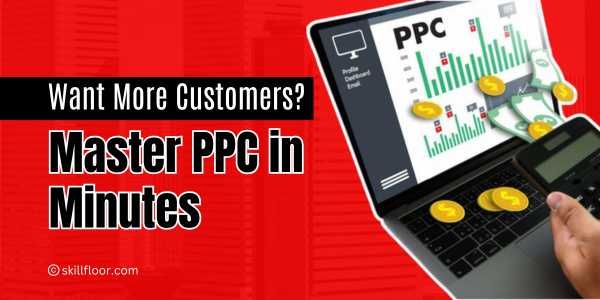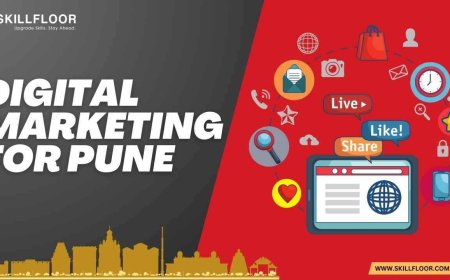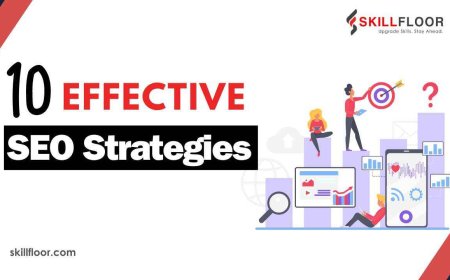What is PPC in Digital Marketing
Still, ignoring PPC? It's like letting your best customers walk by while competitors welcome them. Time to drive targeted traffic and see real results!

Have you ever wondered how certain brands can rank so well in search engine results almost instantly? Or how companies might use the internet to reach new customers directly with their ad campaigns? A technique known as PPC (Pay-Per-Click) advertising frequently offers the key to the solution. As an experienced professional in digital marketing, I experienced PPC's transformation from a niche advertising strategy to a widely used powerhouse for companies of any size.
According to WordStream, current data shows that more than 65% of all clicks made by customers looking to buy anything come from paid search advertisements. This shows the potential effectiveness of PPC in digital marketing when executed correctly. In addition, the enormous impact of this model on digital marketing strategies can be seen in the $223 billion in revenue from advertising that Google Ads alone generated in 2022.
In the early days of PPC, getting clicks was the main goal. But now, it's all about focusing on the correct audience, increasing conversions, and continuously improving campaigns to generate better results. PPC is an essential strategy in digital marketing for companies looking to increase brand awareness, drive traffic, and produce leads. Effective use, however, requires an understanding of its intricacies. We will go into great detail about PPC in this blog, including what it is, how it operates, and how it may increase your online visibility and revenue.
What is PPC in Digital Marketing?
In digital marketing, PPC is simply a type of online advertising in which companies pay a fee each time one of their ads is clicked. In simple terms, it's a method of purchasing website traffic instead of obtaining it naturally through SEO. Although PPC is often associated with Google Ads, PPC campaigns can be executed on a variety of platforms, such as Facebook, LinkedIn, and Bing.
The beauty of PPC in digital marketing is its quickness. Your advertising can begin showing up immediately after setting up a PPC campaign, frequently within minutes, on search engines and websites that the target audience is currently visiting. It's a great method to bring in targeted visitors to your website, and if done right, it may yield a high return on investment.
For example, a neighbourhood coffee shop might use PPC to advertise a special offer, focusing on locals who are actively looking for coffee-related goods or services. This is only one of the several ways PPC in digital marketing may help companies reach the right target demographic.
How Does PPC in Digital Marketing Work?
PPC uses a bidding system in which advertisers bid on particular placements or keywords. The higher the bid required to get a prominent ad placement, the more competitive and relevant the term. When someone searches for business-related terms, such as "best coffee in New York" or "buy organic skincare products," your ad appears in search engine PPC campaigns like Google Ads.
You pay the predetermined amount when a user clicks on your advertisement, and they are taken to your website. Any PPC approach used in digital marketing attempts to increase conversions, whether they be purchases, sign-ups, downloads, or other desired actions, rather than just clicks.
Why Does PPC Work So Well?
PPC's immediacy is its greatest feature. PPC results are very immediate, in contrast to organic SEO, which takes time to develop and establish rankings. If a company's targeting and bidding techniques are set up properly, they can see visitors within hours of posting their advertising.
According to surveys, 45% of small businesses plan to spend more money on PPC ads in the upcoming year, highlighting the growing significance of this type of advertising in modern advertising techniques.
PPC also provides a degree of precision that isn't always possible with other forms of advertising. Ads can be targeted according to criteria such as:
-
Location (e.g., only targeting customers in a specific geographic area)
-
Device (e.g., showing ads to mobile users)
-
Demographics (e.g., targeting users based on age, gender, or interests)
-
Time of Day (e.g., running ads only during peak business hours)
Types of PPC Campaigns
Businesses can use a variety of PPC campaign types to achieve their goals:

- Search Ads: The most common kind of PPC advertisements are search ads. When users search for pertinent terms, they show up on search engines like Google. They frequently show up either above or below the natural search results.
-
Display Ads: These advertisements appear on websites that are part of networks like the Google Display Network. Display advertisements may take the kind of interactive material, films, or banners.
-
Social Media Ads: PPC campaigns are available on sites like Facebook, Instagram, LinkedIn, and Twitter, allowing companies to target particular demographics according to factors like geography, interests, and behavior.
-
Shopping Ads: These ads, which display products directly with pictures, prices, and a brief description, can be found on Google Shopping and other sites.
-
Remarketing Ads: Remarketing is a strategy used by companies to target people who have been to their website before but have not made a purchase. As customers browse other websites, this maintains the brand in their line of sight.
Why is PPC in Digital Marketing So Effective?
PPC is powerful in digital marketing because of its accuracy and quantifiable results. compared to traditional advertising techniques, PPC allows you to target a highly particular audience according to search history, location, age, interests, and other criteria. Reaching the correct individuals at the right time is ensured by this accuracy.
For example, you can target adverts to customers who are searching for terms like "buy running shoes" or "best fitness gear for beginners" if you are operating an eCommerce business that sells sports equipment. It also means that spending money on impressions from users who are likely to convert is not a loss.
The ability to monitor success in real-time is another factor contributing to PPC's effectiveness in digital marketing. You may keep an eye on important indicators like return on ad spend (ROAS), cost per click (CPC), conversion rate, and click-through rate (CTR). This degree of understanding enables you to continuously modify your approach to maximize your outcomes.
Statistics on the Effectiveness of PPC in Digital Marketing
Here are some compelling stats that show just how effective PPC can be:
-
Google claims that for every $1 spent on Google Ads, advertisers receive $8, indicating that properly optimized PPC campaigns can yield significant returns.
-
PPC is the most successful paid digital marketing channel, according to 56% of marketers, while display advertising is preferred by 22%.
-
Google Ads is the most popular platform for PPC campaigns worldwide, accounting for more than 70% of search engine ad spending (source: Statista).
The statistics show the real advantages of using PPC, whether it's increasing brand awareness in the crowded digital market or improving the bottom line.

Key Benefits of PPC in Digital Marketing
-
Immediate Results: PPC advertisements can drive traffic to your website right away after they go live, in contrast to SEO, which may take some time to produce results.
-
Targeted Audience: As previously stated, PPC in digital marketing enables you to target your audience precisely according to their location, device, search history, and other factors. This makes it more likely that the most relevant individuals will view your advertisements.
-
Budget Control: Your PPC budget is entirely within your control. You can pause or modify your campaigns as necessary, and you can establish a daily or monthly budget cap.
-
Measurable Performance: It is possible to track and measure every element of a PPC campaign, giving important information about what works and what doesn't.
Real-Time Example: The Power of PPC in Action
PPC advertising was used by an HVAC company to expand its customer base and generate more qualified leads. Through the use of high-intent words such as "emergency heating repair" and "air conditioner repair near me," they were able to connect with people who were actively looking for quick fixes. Location-based targeting was used to further refine the campaign and make sure that only people in their service region saw the advertising. The HVAC company wanted to increase traffic while staying within budget, so they used competitive bidding and well-written ad material. WordStream's 2016 AdWords Industry Benchmarks show that the average CPC and conversion rate for the HVAC sector are $8.67 and 3.22%, respectively. However, in several important criteria, the HVAC company outperformed these averages.
The HVAC company observed a CTR of 4.5% (far better than the industry average of 2.41%), a CPC of $7.25 (lower than the benchmark), and a remarkable conversion rate of 5.8% (almost 80% more than the industry average) within just 90 days of the campaign's first appearance. Their CPA fell to $225, significantly less than the industry standard of $323, showing the success of their focused strategy. This accomplishment demonstrates how PPC can generate high-quality leads and yield an excellent return on investment when campaigns are well-planned, optimized, and targeted to a particular demographic.Source: WordStream, "Google AdWords Industry Benchmarks"
Best Practices for Running PPC Campaigns
Here are some important practices to remember in order to maximize PPC in digital marketing:
-
Choose the Right Keywords: Do your homework and pick terms that are not only relevant but also have a lot of searches and little competition. This is when tools like SEMrush and Google Keyword Planner come in handy.
-
Optimize Your Landing Pages: Ensure that your landing pages are easy to use, load rapidly, and have a substance that lives up to the promise of your advertisement.
-
Test and Adjust: To determine what works best, test various iterations of your advertising, targeting choices, and keywords regularly. Your campaigns can be optimized with the use of A/B testing.
-
Use Negative Keywords: By including negative keywords in your ads, you may prevent squandering funds on pointless clicks. This guarantees that only users who are likely to convert see your adverts.
-
Monitor and Refine: PPC is not a "set it and forget it" strategy; it requires constant monitoring and improvement. To increase outcomes, keep a close eye on your campaigns, review your data, and adjust your strategy as needed.
PPC is an effective technique in digital marketing that gives companies a simple way to draw in customers, raise their profile, and produce leads. You may place your advertisements in front of the appropriate people at the right moment due to this highly focused strategy. With its drawbacks, PPC is a useful strategy for companies who want to succeed online because of its advantages, which include quantitative performance, control over budgets, and instant results.
PPC may significantly increase your company's growth if you have the appropriate skills, resources, and strategies. PPC in digital marketing can help you in successfully achieving your objectives, whether they be to increase e-commerce sales, create leads, or increase brand awareness.






























































